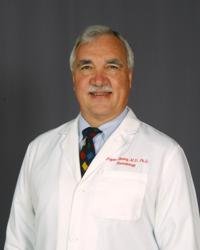About
Dr. Ohning attended Purdue University, graduating with a bachelor’s degree in Biochemistry. He matriculated at Case Western Reserve University, graduating with a M.D. degree and a Ph.D. in Biochemistry. He trained at Duke University Medical Center in Pediatrics. His Fellowship training in Neonatology was at the Cincinnati Children’s Hospital. He was subsequently awarded a Clinician-Scientist grant from the American Heart Association and stayed on faculty for several years at the Cincinnati Children’s Research Institute. His research was on pulmonary surfactant proteins. That lab patented the artificial surfactant known as “Survanta”. Dr. Ohning then accepted a faculty position at the Medical University of South Carolina, transferring his grant and research lab to Charleston, SC. During this time, he also became the Medical Director of the MeduCare Neonatal Transport Team and the outreach program of the Perinatal Region. In 2000, Dr. Ohning relocated to the Greenville Children’s Hospital. For the next 16 years he was the Medical Director of the NICU and the Neonatal Transport Team. During that time, the average patient care days for the NICU climbed from 10,000 to >20,000 per year. Dr. Ohning has also remained active in teaching medical students, residents, neonatal transport personnel and Neonatal Nurse Practitioners. He has routinely been a speaker at national nursing conferences on pharmacology and pharmacokinetics. He recently has formed a research affiliation with the Department of Psychology at Clemson University, exploring research in the realm of teamwork in the NICU environment.
How their research is transforming health care
Neonatal Intensive Care Units (NICUs) care for the most tiny and fragile humans. The premature infants can be up to 18 weeks early and weigh in at considerably less than a pound. They always have nutritional challenges, often have respiratory failure may have congenital anomalies, infections, and metabolic disorders. The total length of stay may sometimes exceed a year. This is exceedingly difficult for the families of these fragile infants. Our patients require the expertise and intervention of many medical professionals, all the while needing to interface with the families. Teamwork is essential in this environment to navigate complex and frequent interactions to coordinate care for the NICU infants. To care for and protect this fragile patient population, the NICU is a secured, limited access, cloistered environment. Therefore, access to any NICU to allow study of teamwork - Centered Caredynamics is difficult. Dr. Traylor (Clemson University, Department of Psychology) and Dr. Ohning (Professor of Pediatrics, former NICU Medical Director) have established a professional relationship, successfully gaining entry and trust to allow study of these complex interactions. In our initial research, we have observed inter-professional interactions during rounds, finding that observed teamwork behaviors predict staff member’s psychological safety and voice. We have also assessed interactions with families concerning education, emotional support, and integration into care of their baby. We are currently in the process of disseminating our research findings to the staff and designing the next phase of our research endeavors to focus on the patient family experience through the NICU stay.
Health research keywords
Teamwork, Psychological Safety, NICU, Neonatal, Family-Centered Care, Multidisciplinary Rounds

